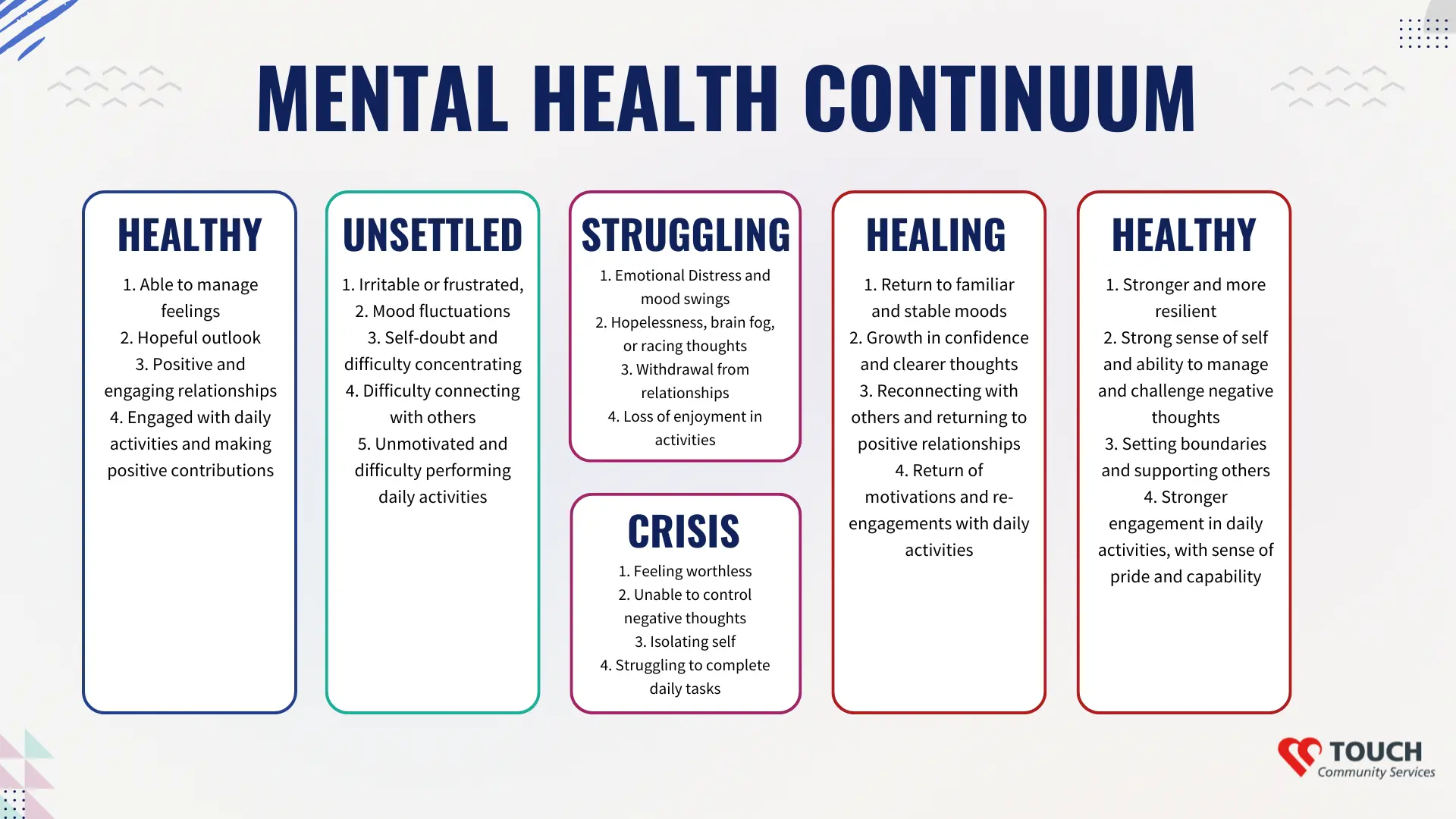Healthy Coping Mechanisms for Better Mental Health

Our mental health exists on a continuum [1]. Challenging events such as failure to meet expectations may cause us to feel unsettled for several days before we feel mentally healthy again [1]. However, if we do not address these challenging events adequately, our mental health may also deteriorate, resulting in us struggling with our mental health or experiencing a mental crisis.
MENTAL HEALTH CONTINUUM
The mental health continuum reflects how our mental health is a range of mental states rather than the presence or absence of mental illnesses. Our mental health may fluctuate between these healthy and unhealthy mental states.

UNHEALTHY COPING MECHANISMS
Using unhealthy coping mechanisms to deal with difficult situations may make these situations worse [2]. They may offer temporary relief from these situations, but they do not help us to deal with them productively and may even worsen our mental health in the long-run [2].
Toxic positivity: While being positive is important, toxic positivity is harmful as it compels you to suppress all negative emotions and remain relentlessly positive even when it is inappropriate [2]. This causes you to ignore your negative emotions and may lead to less empathy for others [2]. Sayings such as “You should be grateful for what you have” attempt to find the positives in difficult situations but they minimise and invalidate your emotions and experiences [2].
Avoidance: While avoiding your problems may bring relief, it prevents you from becoming more resilient [2]. In the case of anxiety, avoiding your triggers may worsen your anxiety in the long-run as it deprives you of the opportunity to confront your triggers and overcome your fears [2]. Avoidance behaviours include procrastination, ignoring your problems, escaping into activities, working and sleeping too much, and withdrawing from social activities [2].
Substance abuse: While using substances such as alcohol or drugs to cope may feel good, it may lead to other problems, such as addiction, financial difficulties, or relationship problems [2]. Signs that your substance use has gotten out of control include frequent substance use, difficulty stopping substance use despite wanting to, and experiencing withdrawal symptoms [2].
Self-harm: Self-harm involves hurting yourself on purpose to cope with difficult situations [2]. It may be driven by the desire for temporary release from the pain you are suffering or used as a means to punish yourself for any perceived mistakes [2]. Common types of self-harm include cutting, burning, hitting yourself, and starving yourself [2]. These behaviours may be addictive and difficult to stop [2]. Self-harm is serious and professional help should be sought to prevent further physical injury to yourself.
HEALTHY COPING MECHANISMS
Instead of resorting to unhealthy coping mechanisms to deal with challenging situations, here are some healthy coping mechanisms you can adopt to help you cope with challenges as you grow more resilient.
Identify your triggers: By identifying the scenarios that trigger your negative emotions, you can develop a plan to deal with them [2]. Ways to identify your triggers include observing when situations elicit strong emotional responses or cause physical symptoms such as a pounding heart or upset stomach [3]. When these strong emotions appear, do not try to ignore or fight them, but approach them with curiosity instead to understand what triggered them [3]. Understanding your triggers allows you to address the situations directly and make changes to how you respond to these challenges [3].
Practise relaxation strategies and mindfulness: Relaxation strategies and mindfulness can help you to improve your mood [3]. Activities such as breathing exercises, progressive muscle relaxation, and journalling allow you to relax and release any tension [2]. Practise mindfulness by meditating or picturing your “happy place” [4]. By engaging with these practices, you can feel calmer and refocus on the present.
Practise self-care: Caring for yourself while experiencing difficult situations can alleviate your suffering. This includes doing activities you enjoy, spending time with your friends and family, or going for walks in nature [5]. By doing these simple activities, you can reduce your stress and improve your quality of life [5].
Seek professional help: Counselling provides you with a non-judgemental space to address difficult situations [3]. A therapist or counsellor can guide you in regulating your emotions if you are unable to do it on your own. By working with you to explore your triggers, they can equip you with healthy coping mechanisms to deal with your challenges independently and help you find solutions to your problems [3]. TOUCH Counselling & Psychological Services offers support for those who are distressed or having negative thoughts. You may call the TOUCHline at 1800 377 2252 (Mondays to Fridays, 9am to 6pm) to speak with a counsellor.
While we may be struggling with our mental health or facing a mental crisis, there are solutions around it. By adopting these healthy coping mechanisms, you’re taking one step closer to healing and developing the mental resilience needed to cope with the challenges in life.
TOUCH Counselling and Psychological Services Group (TCPSG) runs personalised therapy and counselling programmes to empower individuals to be more resilient, cope with daily living, and rise above their circumstances. Through its Supportive Intervention Care Model which comprises Community Care, Private Care and CareTech, TCPS ensures that individuals and families from all backgrounds receive timely care curated to their specific needs. Its expert team of counsellors, psychologists and psychiatrists specialise in areas such as, psychological assessment and diagnosis, trauma therapy, suicide prevention, youth mental wellness, and digital addiction intervention and affair/divorce recovery.
Sources
1. “What is mental health?” Beyond Blue, https://www.beyondblue.org.au/mental-health/what-is-mental-health
2. Alex, Salman. “Unhealthy Coping Mechanisms” Clear Behavioral Health, 17 Mar 2025, https://clearbehavioralhealth.com/unhealthy-coping-mechanisms/
3. Crystal, Raypole. “How to Identify and Manage Your Emotional Triggers” Healthline, 13 Nov 2020, https://www.healthline.com/health/mental-health/emotional-triggers
4. Amy, Morin. “Healthy Coping Skills for Uncomfortable Emotions” Verywell Mind, 3 Nov 2023, https://www.verywellmind.com/forty-healthy-coping-skills-4586742
5. Jillian, Kubala, and Kerri-Ann, Jennings. “16 Simple Ways to Relieve Stress” Heathline, 3 Feb 2025, https://www.healthline.com/nutrition/16-ways-relieve-stress-anxiety


